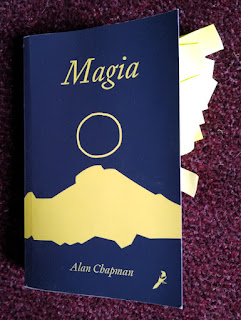EXPANDING MINDSCAPES, ed Erika Dyck and Chris Elcock
If you’re interested in the history of psychedelics you’ll probably have read Lee and Shlain’s Acid Dreams and Stevens’ Storming Heaven for the American experience, and Andy Roberts’ Albion Dreaming and Acid Drops for the UK history, but I bet you’ve not read much about acid in South America. Or China, or Pakistan, or Israel.
In this collection we get a massive broadening of history.
I heard about the book via UK's excellent acid historian Andy Roberts, who told me my name was in it, in an article about acid and anarchism in the 1970s. This was something I wrote in 2015 for a local history website about the Broomhall area of Sheffield, where I lived in the early 1970s. For six months I was a member of a commune, in a 3-bedroom terraced house, with people who were active in the UK anarchist scene. Many of whom were keen on LSD, which we had a plentiful supply of.
So I had to buy the book. It was a very odd feeling to re-read quotes from my article in which our activities were framed as part of a British acid anarchist underground whose most (in)famous activist was Bill Dwyer, founder of the Windsor Great Park Free Festival. The article was ‘Psychedelics, Political Radicalism and Transnational Acid Anarchism in the 1970s’, by Hallam Roffey.
Oddly, the other article with ‘acid anarchism’ in the title also had something close to a personal connection. ‘Did the Master’s Tools Dismantle the Master’s House? Anti-Psychiatry, Robin Farquharson and Acid Anarchism’ by Mark Gallagher is a great overview of the anti-psychiatry movement through the life of one famous freak. Farquharson was a friend of two people I knew from that era, one of whom, Charles Brewster, wrote about the man’s power to pick up radio signals with nothing more than his nervous system, in the seminal and deeply obscure early chaos magick volume Liber Cyber.
This book contains a lot that will inform and surprise, but I’m not going to review it in detail. To see a chapter listing, check THIS.
I am mostly writing this to consider one article, the penultimate one, ‘Becoming Modern in China with an Indigenous Amazonian Psychedelic Brew’ by Alex K. Gearin. This piece was a real eye-opener, focusing on ayahuasca retreats and courses led by US citizen ‘Luke’ in China, and the philosophy of these encounters. Luke’s clients are high-powered cogs in what sounds like the fiercest form of capitalism on the planet, a hideous and dehumanising corporate rat race. In WestCiv, most high-dose psychedelics users (not microdosers) go on trips to find personal and maybe spiritual or magical significance in their visions. Luke’s clients take ayahuasca to get better jobs and succeed at their corporate roles. Initially I was, frankly, shocked by this crass materialism; but as Gearin points out, this is not really so different from Peruvians taking it to heal physical illnesses or work out family conflicts.
Luke’s retreats use a framework of modern self-development and success psychology but also make use of images of the Tao, Buddha and Christ. His basic approach is to talk about two selves - the Suit, who is the working persona, and the Monk, who is the source of integrity, the inner person who supplies intuitions of whether something is right or wrong for us. The process consists of bridging the Gap between Monk & Suit, so that we can bring our deeper selves into play when dealing with work situations. This is very much the opposite of dropping out, which is not surprise at all - these people can't drop out, there's no safety net in China, and a vicious persecution of differentness.
The author takes this phenomenon in a very interesting direction in the section ‘Enchanted Rationality in Modern China’, challenging the idea that we live in a disenchanted world and that psychedelics are part of re-enchanting our experience of it:
‘In contrast to to neo-shamanic ayahuasca practices in Western societies, which focus on otherworldly primitivist visions associated with nature and Indigenous spirituality to confront a crisis of modern life, this practice of drinking ayahuasca in mainland China is nominally secular and overtly embraces modern life in the pursuit of worldly visionary experiences and pragmatic workplace mastery …
‘The practice of unifying the Monk and the Suit and Bridging the gap with the help of ayahuasca drinking disturbs classic theories of modern disenchantment …
‘A religious telos is pursued not against the hyperpragmatism of everyday, but within it … the Monk and the Suit … provide the grounds for integrating religious sensibilities and rational action into a coherent image of the modern self.’
This sent me down another rabbit hole, looking into the so-familiar-it’s-obvious idea that we are re-enchanting a disenchanted world; is that really what’s happening...?
This book is essential reading for anyone interested in the history of psychedelics and much else besides. Unreservedly recommended.




Comments
Post a Comment